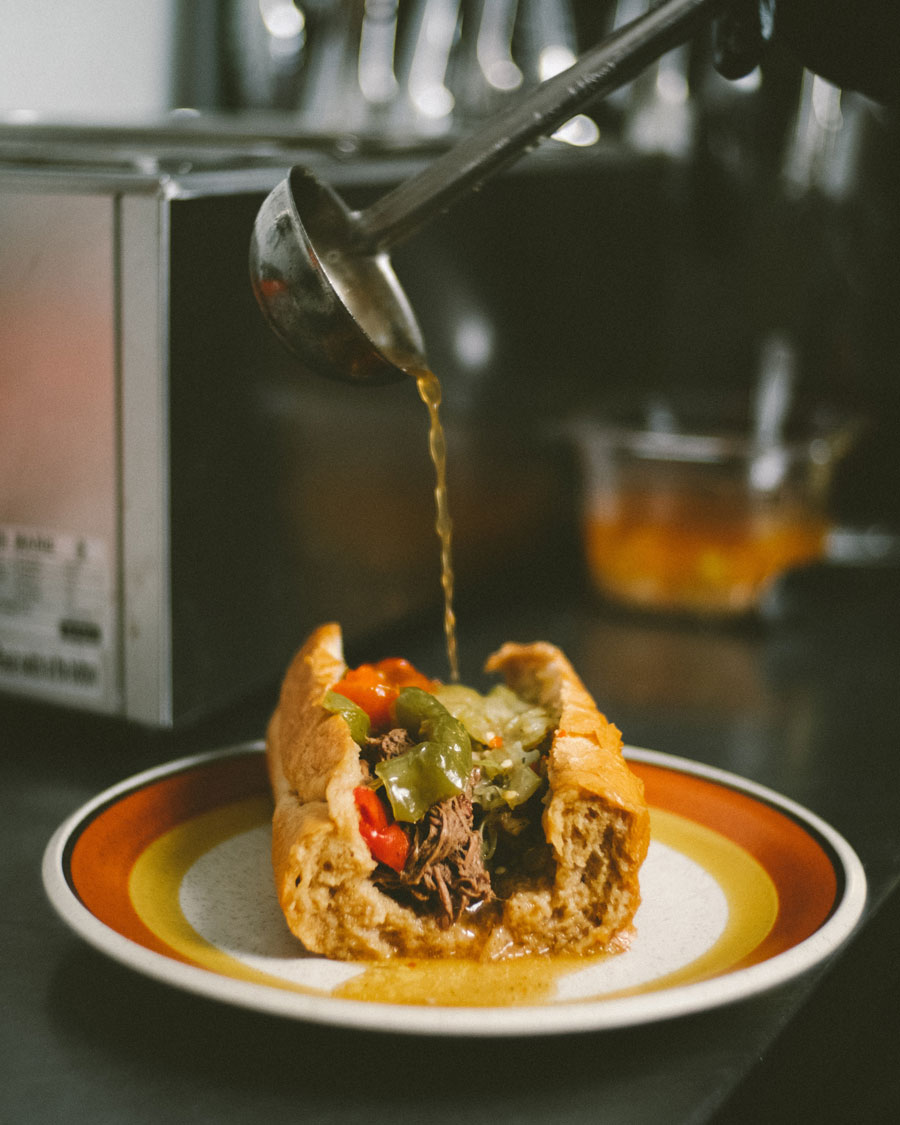
Photograph by Paula Harding Photography
In every issue of Atlanta magazine, we highlight a different pop-up or food truck worth seeking out, and we’ve compiled all of our recent picks below. We’ll update this list monthly. By their nature, these businesses can be inconstant; best to check their Instagram accounts for the latest on where to find them.
This month’s Atlanta pop-up highlight:
Tony’s
I talked to Tony Kerr the day after Paczki Day: a hallowed observance in Kerr’s native Chicago, known better to the rest of the world as Fat Tuesday. Paczkis are a kind of filled Polish doughnut, which Kerr has spent the day selling from the kitchen at Sceptre Brewing Arts in Oakhurst. Born on Chicago’s South Side, Kerr moved to Atlanta in 2019 and launched Tony’s last year. At other pop-up events, his focus is on another Second City export: the mighty, messy Italian beef sandwich. Thinly sliced meat dipped in jus and slathered with sweet and hot peppers, piled onto a roll, the Italian beef is one of those sandwiches people in Chicago form allegiances to. “My favorite spot in Chicago is Al’s Beef,” Kerr said; Al’s is the sandwich he seeks to emulate in his own cooking. Among other from-scratch ingredients, Kerr makes his own giardiniera—the spicy vegetable relish that’s another staple of the city’s culinary landscape.
“And then, of course, everyone wants a Chicago dog when they hear about a Chicago pop-up”: Served on a poppy seed bun, the hot dogs are sourced from Chicago, and real ones know exactly what belongs on them (mustard, sliced tomato, onion, relish, celery salt) and what does not (emphatically, ketchup). “I also do a Maxwell Street Polish, so that’s also more of a South Side thing, with the grilled onions, mustard, sport peppers—something you’re going to get at a Sox game.” Tony’s will be popping up at Sceptre regularly in the near future: one week a month until September. April 2023 issue
Previously:
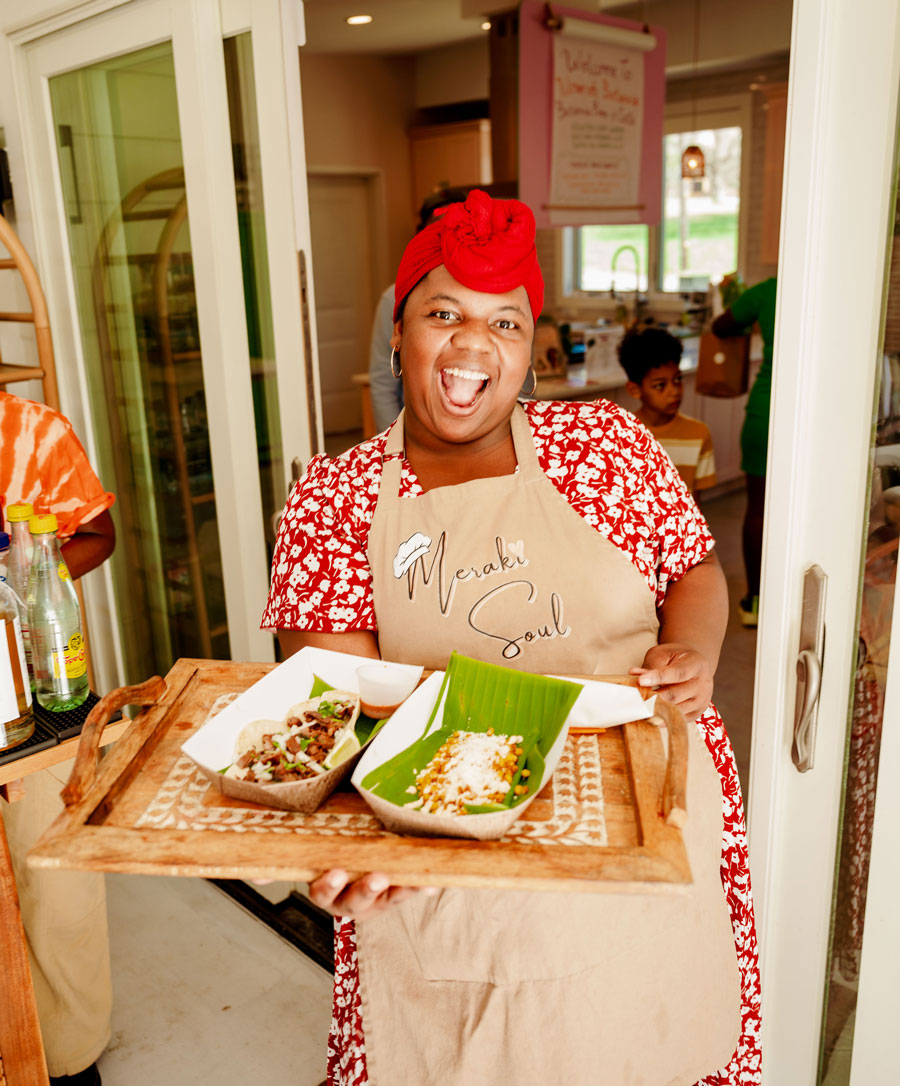
Photograph by Anitra Isler
Nourish Botanica
“It’s a continuation of us being blessed enough to experiment,” says Quianah Upton, referring to her vision for the second year of Nourish Botanica—the plant shop and “greenhouse eatery” that the longtime food justice activist launched in Joyland in March 2022. “As a Black woman, as an artist, that’s something we haven’t had a lot of space for: If this works, if this doesn’t work, I can try again.” The first year was about getting settled in, meeting her neighbors, and learning about their needs. The next phase began at the beginning of March, when Upton launched a food pop-up program: Every Saturday this month, Meraki Soul will be serving plant-based fare, in a kind of residency that Upton plans to repeat with other vendors in successive months, the idea being to offer healthy, affordable, and delicious food to anyone who wants to drop in—and then stay and listen to music in the backyard, or hang out in the cafe. (If you run a food pop-up and are interested, you can apply online.) On Sundays, Nourish Botanica will host a coffee pop-up in a similar arrangement; both days, Upton’s Botanica Bar will serve mocktails, teas, and other nonalcoholic drinks.
The food will be generally plant-based, generally Southern and Caribbean. But guidelines are loose. “We want the chefs to play with what they already do,” Upton says. That’s part of the experimentation. “We’re trying to be as meatless as possible, but we’re not as fiercely tied to that as we were last year because of some of those conversations I’ve had with the neighbors,” she says. “We’re just trying to define—or maybe not define, leave it unknown—what healthy food feels like for Joyland.” March 2023 issue
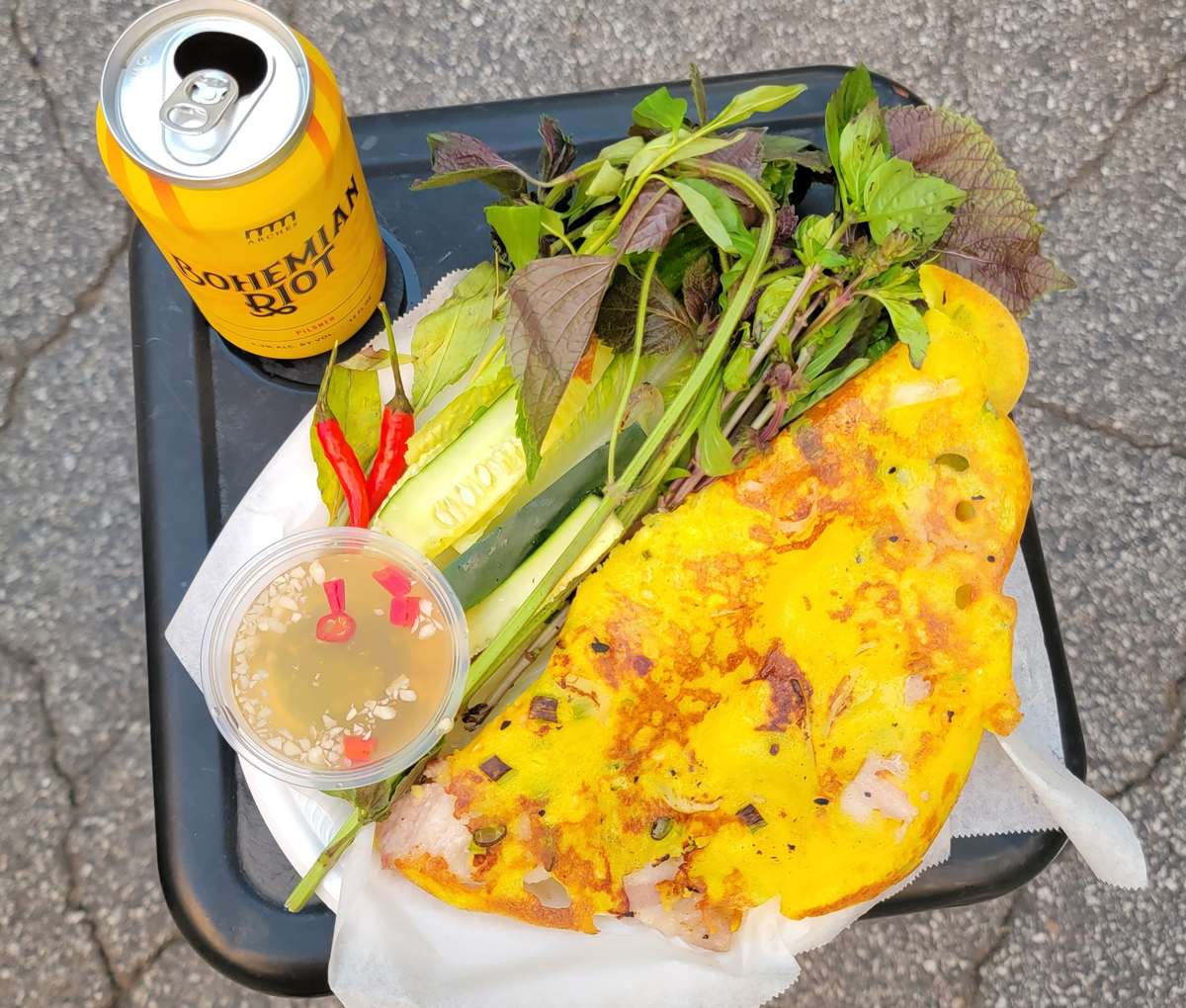
Photograph courtesy of Ba + Me
Ba + Me
The first time I tried to talk to Lisa Bi, we chatted for about three minutes before saying goodbye. She had to go out on a call—Bi’s a paramedic. She works out of a fire station where, as is customary, firefighters and paramedics prepare meals for one another. “It’s honestly one of the best parts of working this job, because you guys can talk shit and be angry or be sad after a call,” she said. “Somebody’s doing eggs. Somebody’s making bacon. Somebody’s setting up the table.” The stress of the job, and the pandemic, inspired Bi to launch this pop-up: “I’ve always had a strained relationship with my family. Seeing all these deaths made me want to reconnect with them and with my culture. And so, I started cooking again.”
She describes the fare as Vietnamese comfort food, homier than you might come across in a restaurant: “My whole concept is to bring food that my parents and I eat—I want people to get a little uncomfortable with some new things.” If you are a person who is attracted to freshness, color, and flavors that hit every corner of the palate, this is beautiful stuff indeed—like banh xeo, a kind of savory crepe tinted yellow with turmeric, filled with shrimp and pork, and served alongside a small mountain of fresh herbs (Thai basil, purple perilla, culantro, and egg mint, aka Vietnamese coriander) and birds-eye chili. Another offering may be banh bot loc goi la chuoi: chewy, translucent tapioca dumplings that Bi, in a vegan version, sometimes fills with wood-ear and oyster mushrooms. Also available with shrimp and pork, they’re steamed in banana leaves; you unwrap them, like a gift. October 2022 issue

Photograph courtesy of Humo
Humo
Despite a culinary education, Christian Lopez didn’t end up in the food industry full-time—he ended up in education, working for the past eight years as a teacher. But in October 2021, Lopez launched this pop-up on the side, inspired by his family’s background in Colombia—a first-generation American, Lopez grew up in Orlando—and by his broad interest in the flavors of Latin America, from Mexican-style elote to Colombian-style shrimp ceviche and empanadas, for which Lopez makes his masa from scratch. Humo means “smoke” in Spanish, and the name here refers to one of Lopez’s favorite methods of cooking, as evidenced in his smoked rendition of the slow-cooked pork-shoulder dish pernil, which he serves on a plate (with sides like esquites and Brazilian collard greens) or sometimes on a Cubano.
One of the standout dishes from the regular rotation: choriperro Colombiano, a sausage stuffed into a bun piled high with queso, pineapple sauce, garlicky mayo-ketchup, and crunchy shoestring potatoes. It’s a beautiful meal to eat one-handed on a warm day, with the other hand filled—preferably—with a cholado, an exuberant Colombian shaved-ice dessert packed with fresh fruit, fruit syrup, and sweetened condensed milk. September 2022 issue

Photograph courtesy of Ganji
Ganji
On one version of the menu they offer to customers, Jun Park and Jess Kim define the name of their pop-up, Ganji, as follows: “familiar American fare with Korean essentials.” Simple enough, but in an email to me, they mentioned that the word has another meaning—as Korean slang for “something really dope.” Ganji, they wrote, “roughly means ‘hard AF.’”
For Park and Kim, two old friends and food-industry vets who launched this project just this summer, that means irreverent, beer-friendly, and highly likeable dishes like burgers with charred kimchi relish and American cheese, fries with ramen seasoning, and some playful reformulations of Korean familiars: Dak Nuggz, for instance, is Korean-style fried chicken nuggets with chewy rice cakes, yam, and a sweet-savory soy-garlic glaze; in the pair’s take on the typically casserole-like Korean corn cheese, they leave the kernels on the cob and slather it with creamy sauce. Their creative flights also take them farther afield, as with kalbi tacos dorados—deep-fried Korean beef tacos—and a veg plate of kalbi-flavored mushrooms on tostadas with guacamole and soy-pickled jalapeños and onions. This summer, Ganji has been popping up on a regular rotation at Sceptre Brewing Arts in Oakhurst. August 2022 issue
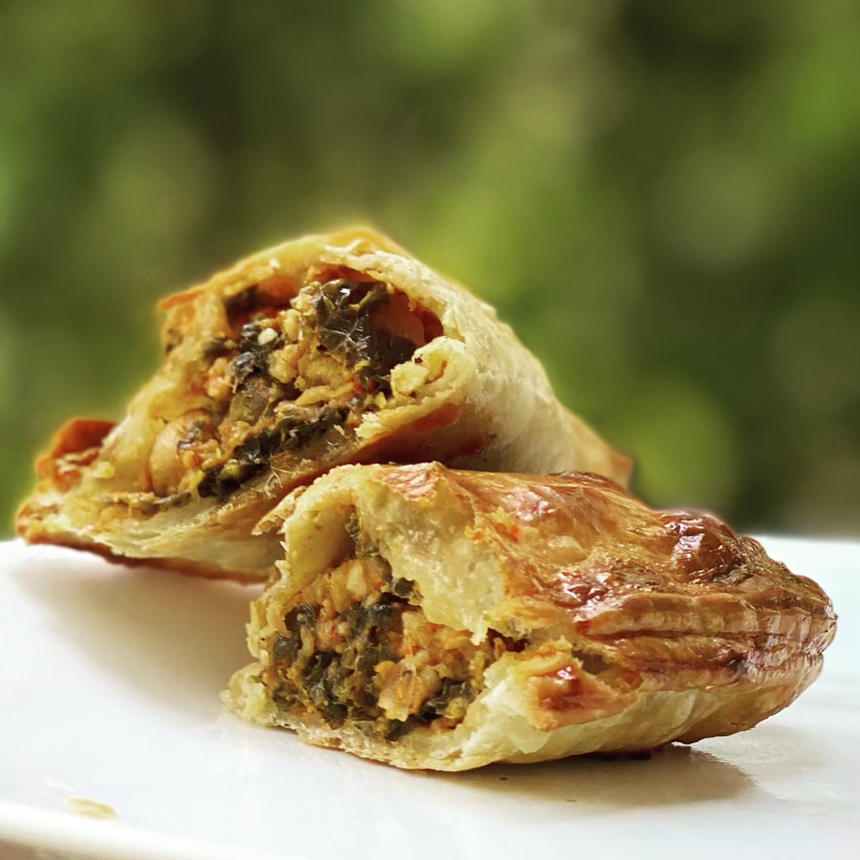
Photograph courtesy of Coffyn Pyes
Coffyn Pyes
First, the name: Coffin, or coffyn, is how 12th-century Europeans referred to the pastry that encased early pie fillings. The bakers, though, aren’t medieval peasants. They’re “basically a couple of moms” who hatched a plan for a pie business while waiting to pick their kids up from school, says Smita Premkumar—one of the moms. Premkumar is from Mumbai, and her business partner, Maribeth Coleman, is from Alabama, so their menu is global in nature, spanning gumbo (chicken, andouille sausage, dark roux) and “Bollywood beef” (with peas, turmeric, and cardamom), plus buffalo chicken, broccoli and cheddar, and a very good chickpea and kale pie with Thai curry flavors.
The menu changes often. The pies, mostly savory, are handheld. Premkumar and Coleman, who live in the Grant Park/Ormewood Park area, launched Coffyn Pyes in early 2020, first with the idea to sell at festivals, until the pandemic put those plans on ice, and they switched gears to frozen pastries. Those are still available to order, but Coffyn Pyes is back out on the streets, too, at neighborhood fests, various pop-up events, and breweries—a kind of venue that works particularly well for this sort of business: “The more pies they eat, the more beers they drink,” Premkumar says. “It’s a perfect combo.” July 2022 issue
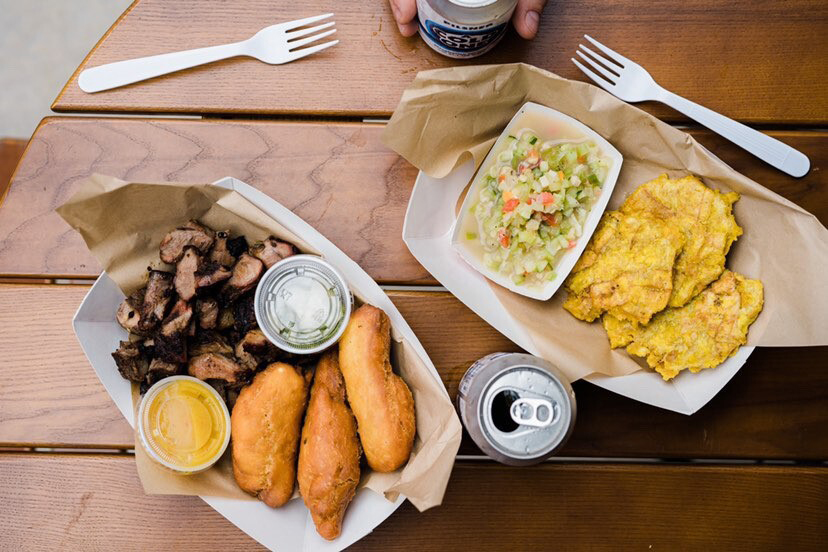
Photograph courtesy of Yaardie Eats
Yaardie Eats
Carrie and Michael DeMessa owned a towing company for 20 years, but the pandemic—and fewer cars on the road—led them to switch gears. Both spouses are descended from Chinese people who came to the Americas in the 19th century to work on the Panama Railroad, then spread around the Caribbean. The DeMessas’ great-great-grandparents ended up in Jamaica, where they “had to make do” with the food at hand, Carrie DeMessa says. “So, over the years, we used soy sauce, oyster sauce, plum sauce; we mixed it with the pimento, or the allspice, and the scotch bonnet pepper.”
Heirs to this Chinese-Jamaican culinary tradition, then, that’s what the DeMessas began cooking when they had a little time on their hands—first for friends and family, and eventually through a food truck that first hit the streets in early 2021. Recruiting their children to help on the weekends, the pair serve Jamaican pan chicken, ackee and saltfish, pepper shrimp—as well as pork and shrimp wontons, lo mein, and mango chicken with homemade sweet and sour sauce. Based in Snellville, Yaardie Eats expanded outward around Gwinnett County, selling at breweries and other venues, and has since begun popping up all over Atlanta. June 2022 issue
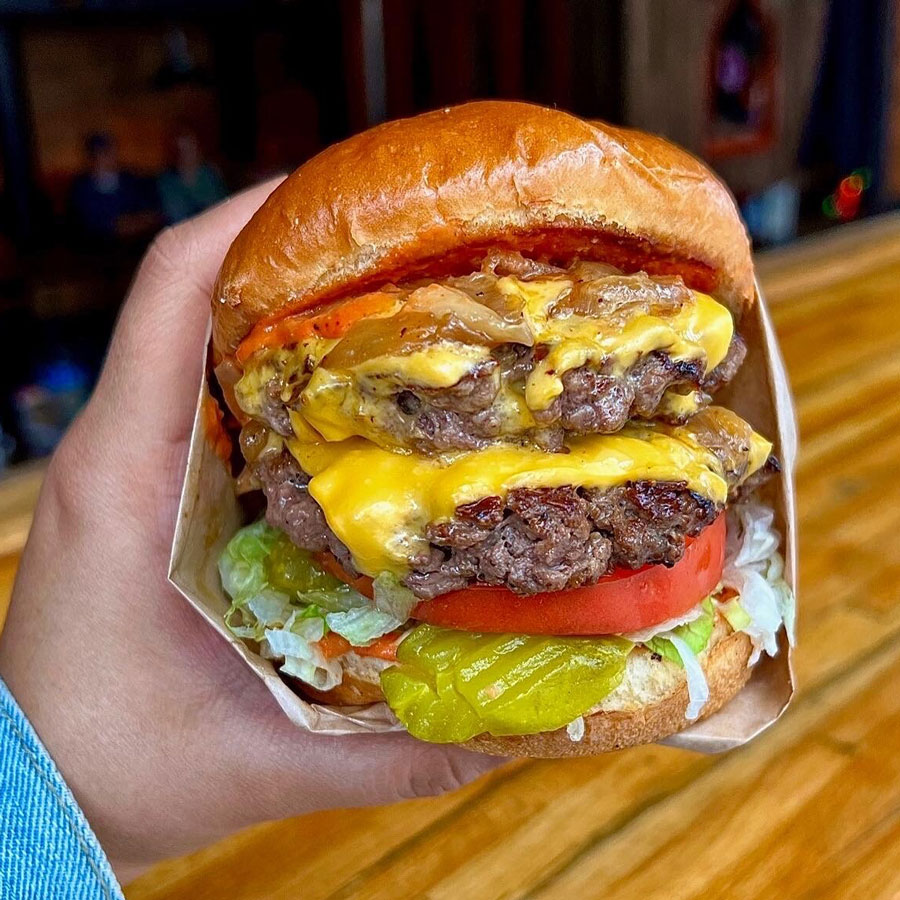
Photograph courtesy of Thicc Burger
Thicc Burgers
Jay Wolfe likes burgers so much that they have a tattoo of one—and it’s life-size, they said: “People are like, What do the burgers look like? And I just show them my arm.” The burgers people ask about are those that Wolfe sells through this pop-up, which they launched in Los Angeles during the pandemic, then brought to Atlanta when they moved here. For Wolfe, the burgers are an exercise in nostalgia: The OG Thicc Burger—the flagship product, with cheese, caramelized onions, Thicc sauce, and the usual fixings—“tastes exactly like the burgers I grew up eating” at California mom-and-pops. Also available: a patty melt, wings, tacos, and, of course, fries.
Wolfe is interested in other people’s nostalgia, too, so when they traveled to New York last year and had a chopped cheese—a beloved bodega special with ground beef and melted cheese on a hoagie roll—they added a version to their own menu; dubbed the Screwburger, it is gooey, fatty, and unabashedly delicious. Thicc Burger lives in Atlanta these days, though Wolfe describes the operation as a “roaming old-fashioned burger joint,” and it isn’t completely tied down: Wolfe occasionally takes the show on the road, popping up in cities across the country. But most of the time, you can find them at breweries around town. May 2022
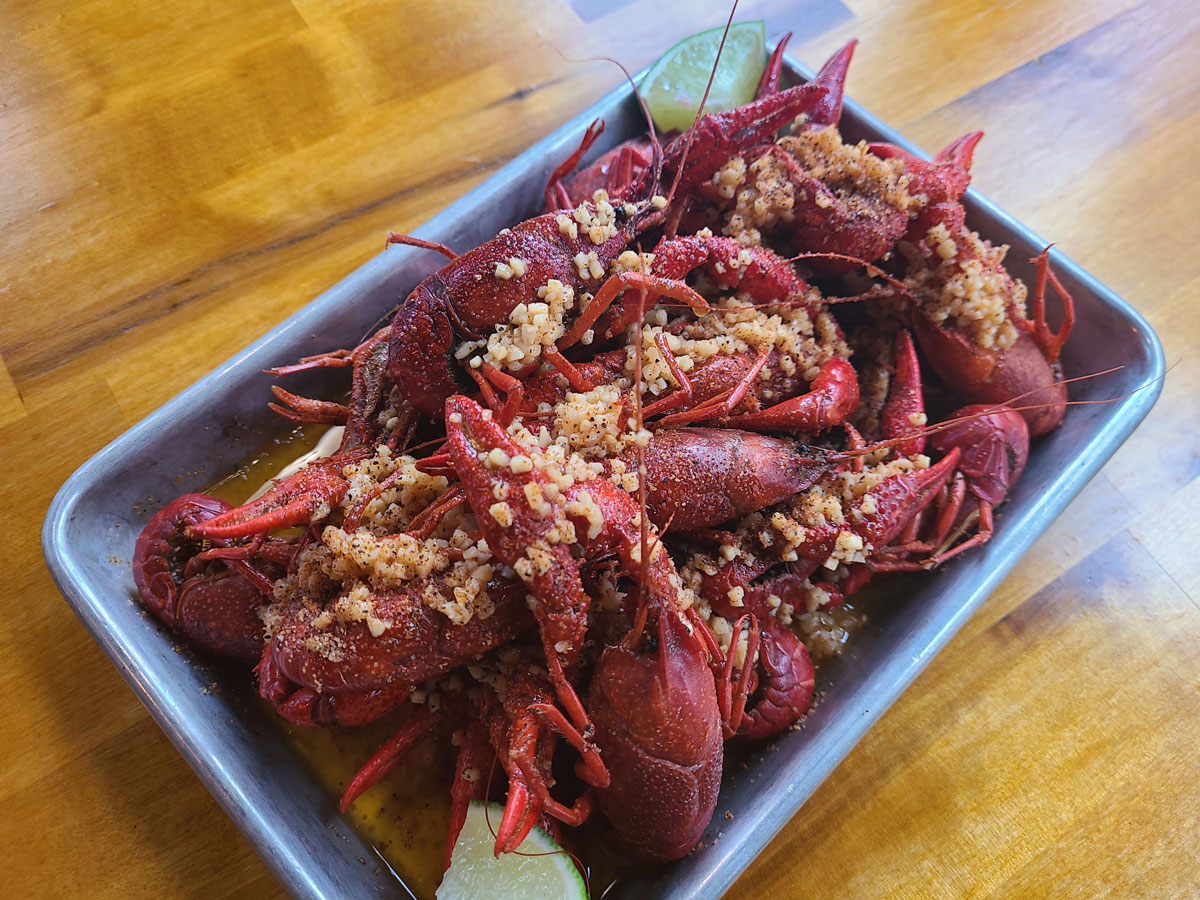
Photograph courtesy of Jackalope ATL
Jackalope ATL
“It is the new f-word,” Dave Mouche concedes—referring to “fusion,” a label Mouche also, if reluctantly, embraces. At some point fusion got a bad rap, but it aptly characterizes Mouche’s cooking, which combines elements of various Southeast Asian cuisines—Thai, Vietnamese—in playful, easy-to-like ways. A po’boy that Mouche makes reflects the culture of Houston, where he grew up: It’s filled with catfish marinated in turmeric in the style of the Vietnamese dish cha ca, then served with dill remoulade (and Cajun fries). He serves a “chili” dog where the chili is the fiery Sichuan preparation ma po tofu and, similarly, a sloppy joe filled with Korean army stew.
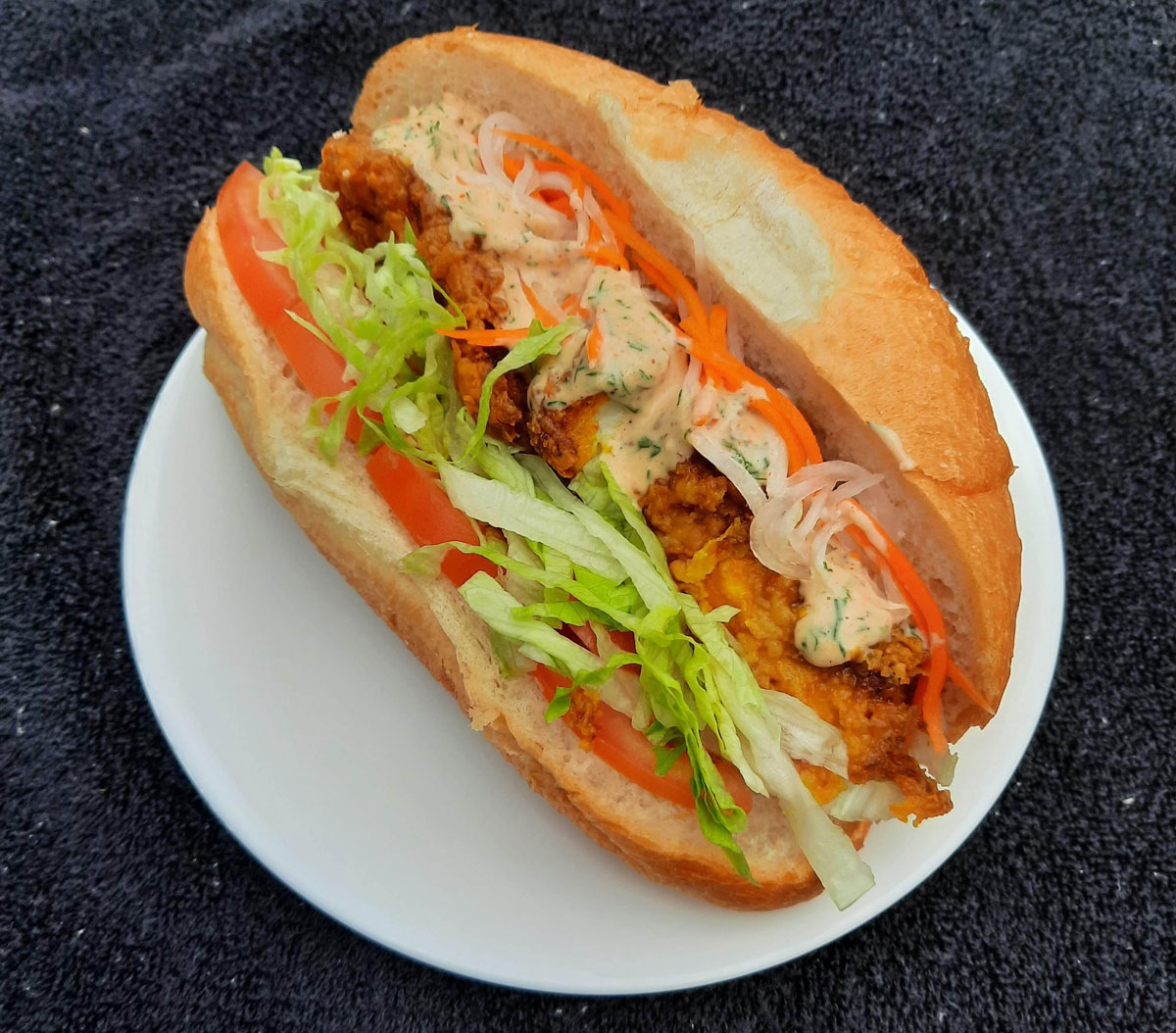
Photograph courtesy of Jackalope ATL
Mouche, whose previous career was in tech, took up cooking while living in Seattle; he moved to Atlanta and got Jackalope off the ground during the pandemic, working for a while as a prep cook at Talat Market. The name, he says, “harkens back to my heritage and my food style. I’m half-Thai and half-white; it’s an animal that has a foot in both worlds.” He’s interested in the places where cultures meet—in foods like khao mok gai, a Thai chicken and rice dish with Muslim and Malaysian influences. “‘Jackalope’ encapsulates that,” he says. “It’s not really a rabbit, it’s not really a deer. It’s something made up that’s both.” April 2022 issue
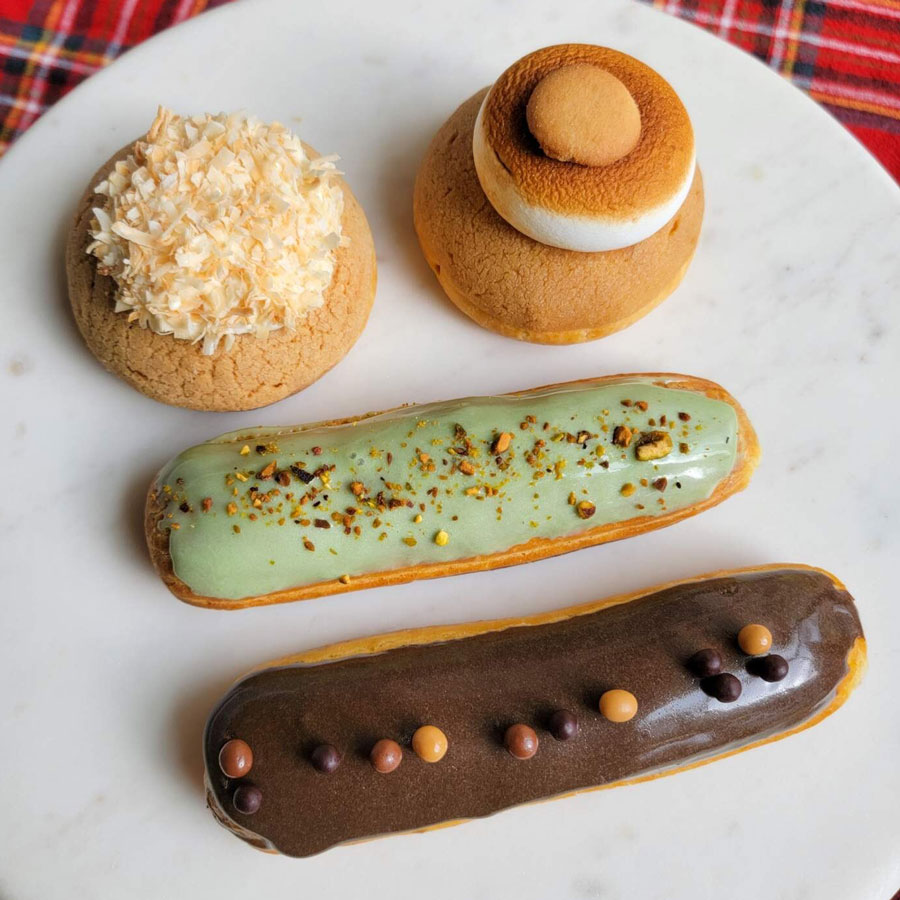 Choux Maker
Choux Maker
Some bakers specialize in national cuisines (Mexican, French), some in broad categories (cakes, cookies). It is the rare pastry artist who builds a business around a single technique. Pâte à choux is one of those alchemical culinary processes whereby a few nothing-special ingredients—flour, eggs, butter, water and/or milk—become altogether something else: the delicate golden shells that serve as the basis for eclairs, cream puffs, and more. It’s the focus of this pop-up from Paul and Amanda Westin, who’ve recently been selling their exquisitely flavored, beautifully wrought pastries on Saturdays at Skate Escape in Midtown, alongside another pop-up, Tic Tac Coffee. The opportunity this presents: You can pick up an airy, crackly, cream-filled pastry (rotating flavors include pistachio, Meyer lemon, raspberry-rose, salted caramel, and more), grab a latte, and enjoy your treats across the street in Piedmont Park. The Westins are hoping this year to break into the farmers market scene, too.

Photograph courtesy of Choux Maker
“Shoemaker” is kitchen slang for somebody who sucks at their job; their food tastes like leather. “When I was starting out, I wasn’t very good,” Paul Westin said. “So I have been called a shoemaker plenty of times.” But since entering the restaurant business in 2004, Westin worked his way up, eventually becoming executive pastry chef for Kevin Rathbun’s restaurants. He and Amanda went all in on the pop-up when the pandemic hit, finding a way to reclaim the term: In this case, Choux Maker means something delicious indeed. March 2022 issue
So So Fed
“Lao food in memory of Grandma Nouphone” is how Molli Voraotsady describes what she serves through So So Fed—incidentally, one of the finest names an Atlanta pop-up could possibly have. Her grandmother cooked “the best Lao food in all of Atlanta,” Voraotsady says, and when she became sick with cancer, it spurred Voraotsady to learn to make her family’s recipes: “She was always force-feeding us food. That was her love language. We come from a refugee family, so nobody says ‘I love you’—they didn’t talk about feelings with us. It was just like: ‘Here, eat this.’”
These days, Voraotsady serves those dishes Tuesday nights at the Bookhouse Pub (736 Ponce de Leon Avenue, Virginia-Highland), and Thursday, Friday, and Saturday nights at Qommunity (477 Flat Shoals Road, East Atlanta Village), as well as at other occasional pop-ups around the city. Lao food is “very soulful,” Voraotsady says. “It’s like the funkiest Thai food you can imagine. Lots of fermented flavors, lots of fish sauce, lots of herbs, and lots of grilled meat.” Sticky rice is the staple. She also serves laab (aka larb—the spicy, funky meat salad), papaya salad, beef pho, fried chicken hearts, red curry chicken (or tofu), and more. The menu changes frequently, and isn’t huge, which is a hidden benefit: Bring a friend or two and you can order just about everything. February 2022 issue

Photograph courtesy of Mighty Hans
Mighty Hans
“In my mind, it’s just like soul food,” says Fu-Mao Sun, describing the Taiwanese fare he serves at his pop-up, Mighty Hans. “It’s very near and dear to my heart.” Growing up in Massachusetts, Sun took summer trips to Taiwan, where his mother is from; in Taipei, he fell in love with the night markets. Taiwanese cuisine reflects Chinese and Japanese influences among others, and the prominence of street vendors means grub that’s simple, satisfying, and easy to take on the go. “Every vendor serves one thing,” Sun says.
For instance, fan tuan: sticky rice wrapped around assorted fillings and eaten at breakfast. Sun’s version is stuffed with a fried egg, pork floss, pickled radish, bean paste, and a cruller fried twice for extra crispiness. It’s a wonder of contrasting textures and salty, umami-rich flavors, and it’s been on the menu this winter at Gato, where Mighty Hans has been doing a breakfast pop-up on Saturdays. Sun, who previously worked in Manhattan at NoMad, puts his own spin on the dishes he’s fond of, like scallion pancakes filled with bacon, egg, and cheddar cheese. (Your McMuffin could never!) In other venues, Mighty Hans does nonbreakfast items, too—bao, Taiwanese fried chicken. And, importantly, Sun has a sweet side: If you can, grab a piece of the custard toast with pineapple, and a mochi doughnut or two. January 2022 issue
Brave Wojtek
Wojtek was the name of a brown bear adopted into the Polish army in 1942, achieving the rank of corporal before retiring to Scotland as the war ended. A kind of folk hero, Wojtek enjoyed the familiar creaturely comforts: beer, cigarettes. In that sense, he makes a good mascot for this new Polish pop-up from Matt Reeves, a restaurant-industry vet who was formerly the general manager at One Eared Stag. Reeves had thought about starting the project over the summer—but “the heat index was just out of control,” he said. “Polish food is kind of heavy.”
Reeves, whose mother’s side of the family is Polish, grew up eating this sort of fare. Dishes this winter range from the familiar—pierogi, stuffed cabbage rolls, barszcz (aka borscht)—to the less so, like zapiekanka: a snacky street food that’s basically a French bread pizza, topped with wild mushrooms, smoked cheese, and onions and drizzled with ketchup. It’s as satisfying as you might imagine. The menu also includes hearty dishes like bigos, a stew with sauerkraut, sausage, “and, traditionally, wild game like boar or venison. But I’m not a hunter”—Reeves laughed—“so that’ll be, like, beef shoulder or pork shoulder.” December 2021 issue
Kajun Asian Food Truck
After Hurricane Ida blew through in August, Thuan Nguyen put out the call: He was heading home to help. Using $2,000 he raised in Atlanta, partly from sales from his food truck, Nguyen bought supplies to deliver to Houma, Louisiana, where he grew up. New Orleans and surrounding areas are home to a robust Vietnamese population—which has produced, Nguyen says, a culinary “match made in heaven.” Vietnamese cuisine already has a pronounced French element due to colonialism. In the Delta, that mixes well with French-inflected Creole foodways; the Vietnamese affection for herbs and spices, meanwhile—cinnamon, cloves, chilis—complements local African and Caribbean influences. So, yes, Nguyen serves gumbo.
But he also does kimchi fries, a lobster roll with yuzu aioli, and a fantastic shrimp po’boy with chili mayo and a ginger vinaigrette. (Also: great french fries.) A classically trained chef who’s cooked at South City Kitchen and Noble Fin, Nguyen struck out on his own in 2019 and makes regular appearances around town—often in the northern burbs. Find him on Instagram, or via a calendar of upcoming dates at kajunasianfoodtruck.com. November 2021 issue
Sugar Loaf
Lindsay and Nebi Berhane met on a cruise ship—not sightseeing, but dancing. Both are professional dancers who have performed in New York, Chicago, and elsewhere, but when they moved to Atlanta from Manhattan last year, it was in pursuit of a different art: pastry. The pair’s burgeoning business, Sugar Loaf, has two weekly farmers market gigs—Avondale Estates and Piedmont Park— selling biscuits, cookies, pies, and assorted other sweet and savory treats.
“I guess, as a dancer, I started learning how to cook and bake out of necessity,” says Nebi—not much disposable income. Lindsay previously worked a series of pastry jobs while keeping up her obligations on the stage. Both Nebi and Lindsay were influenced by their mothers (Ethiopian and Albanian, respectively), which helps account for the global flavors on their menu: for instance, in their “sticky buna,” topped with caramel infused with Ethiopian coffee (“buna” = “coffee” in Amharic); in liege-style waffles flavored like churros and served with dulce de leche ganache; and in seasonal specialties like a Provençal-style tomato pie. October 2021 issue
Kimchi Joy
If the Korean dishes served some nights lately at Ria’s Bluebird have a particularly homecooked flavor to them, there’s a good reason for that: They’re prepared by a seven-member family under the direction of Kajo Kim—or, as she’s sometimes called in Instagram posts, “our mom.” The Kim parents work in construction and design, where jobs can be unsteady. “Whenever it’s a slow period, we’re like, Oh, man, we should open a restaurant,” says Onyew Kim, the eldest of five siblings involved in Kimchi Joy, which got underway in April and now pops up about twice a month at Ria’s in Grant Park.
Often focusing on Korean classics such as buhlgogi and japchae, the dinner menu follows the Kims’ whims. One week, it may be a subtly spicy dahkdoritang—braised chicken with potatoes and carrots; another, bibimbap and chilled cucumber soup. Come winter, the Kims hope to focus on the preparations “where Korean food really shines,” Onyew Kim says: warming dishes like dduhk mandu guk (rice cakes and dumplings in bone broth) and kimchi jjigae (kimchi stew typically made with pork belly). “I know everybody says their mom is the best cook,” Kim says. “But we say that, too—and believe it to be true.” September 2021 issue




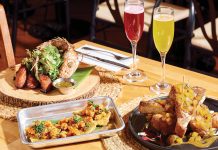



![The North Carolina Museum of Natural Sciences’ newest exhibit is a [pre]historic first](https://cdn2.atlantamagazine.com/wp-content/uploads/sites/4/2024/04/DD-3-100x70.jpg)




